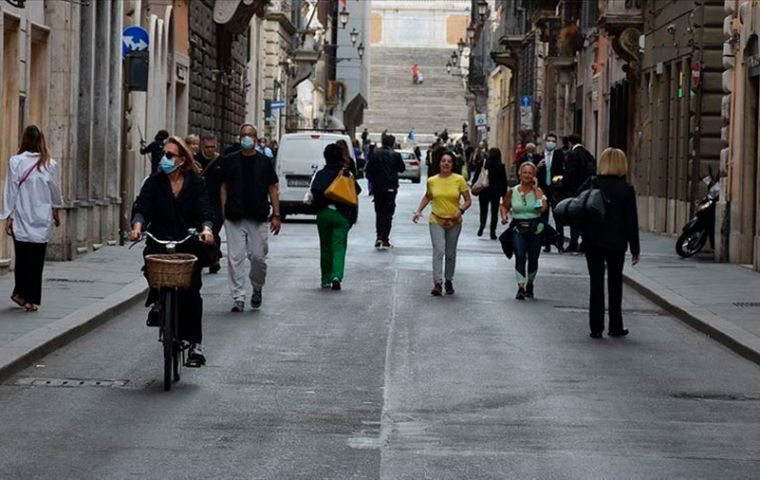MercoPress. South Atlantic News Agency
New epidemiological scenario in restriction-free Europe
 An increase in COVID-19 cases is noticeable in countries which “have lifted restrictions brutally,” Kluge said
An increase in COVID-19 cases is noticeable in countries which “have lifted restrictions brutally,” Kluge said World Health Organization Director for Europe Hans Kluge Tuesday pointed out during a press conference in Moldova that the epidemiological situation on the continent must still be monitored.
He stressed that the biggest concerns stemmed from countries that have lifted sanitary restrictions.
“The countries where we observe a particular increase are the United Kingdom, Ireland, Greece, Cyprus, France, Italy, and Germany. These countries have lifted restrictions brutally,” he added.
More than 5.1 million new cases of COVID-19 and 12,496 deaths have been reported in the past seven days in WHO's European zone.
The recent decision by many European governments to lift all sanitary restrictions amid a growing spread of the BA.2 variant has created a new scenario for epidemiologists regarding the spread of COVID-19.
According to studies in Denmark, this new strain is 1.5 times more transmissible (but not more dangerous) than the “original” Omicron (also known as BA.1, which was one of the most transmissible). In practice, it has become dominant in some of the countries that are experiencing an increase in cases and that do not have preventive policies.
In the United Kingdom, BA.2 is present in 68.6% of positive samples. Just a few weeks ago, BA.1 was the predominant version.
In Asia too is this variant predominant. It is the one with the most cases and deaths, recorded in Hong Kong, China, and South Korea.
Countries that have lifted all restrictions, including the wearing of facemasks in indoor settings, have also ended mass testing programs and the recommendation that infected patients stay at home in isolation.
Meanwhile, South Korean health officials have instructed crematoriums to burn more bodies a day and funeral homes to add more refrigerators to store the dead as families tried to arrange funerals at the height of the COVID-19 death spike, The Associated Press has reported from Seoul.
The country has suffered a major coronavirus boatload driven by the contagious Omicron variant, which has thrown a previously robust management of the pandemic into turmoil and sent deaths and hospitalizations soaring.
Authorities had already last week allowed the country's 60 crematoriums to cremate for more hours a day, expanding their total capacity from about 1,000 to 1,400 cremations a day. Regional crematoriums are to increase operations from five to seven days a week, Health Ministry official Son Youngrae said.
“There have been regional differences in COVID-19 deaths due to various factors such as the size of the elderly population in each community, and there is also a difference in the capacity of cremations each community can handle,” Son said.
The country reported 384 new COVID-19 deaths on Tuesday, the sixth day in a row with more than 300, including a record 429 last Thursday. The number of patients with the virus in serious or critical condition was 1,104.




Top Comments
Disclaimer & comment rulesCommenting for this story is now closed.
If you have a Facebook account, become a fan and comment on our Facebook Page!